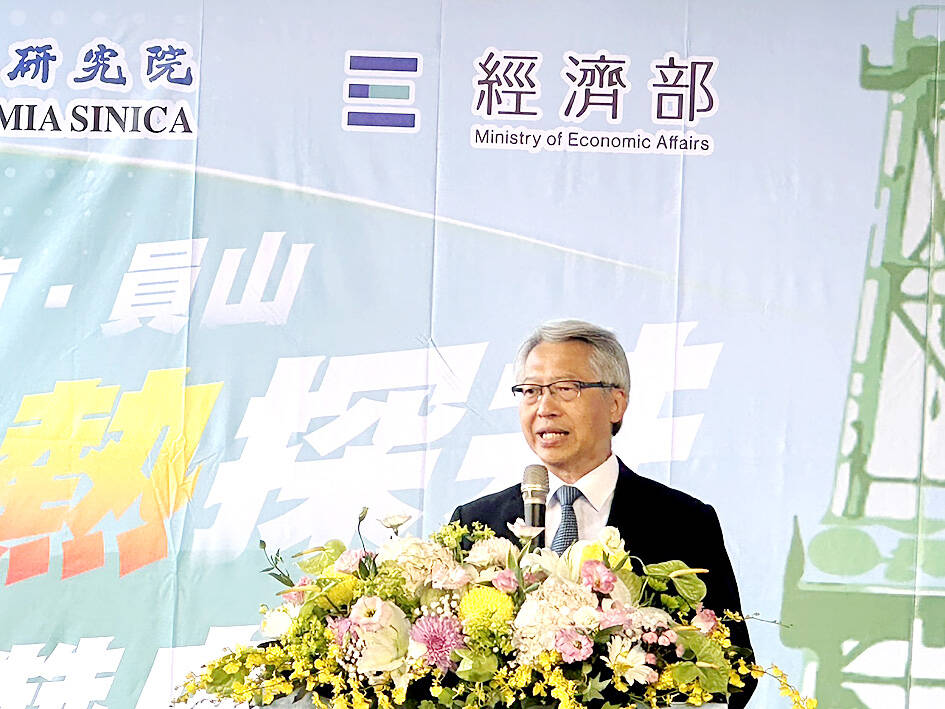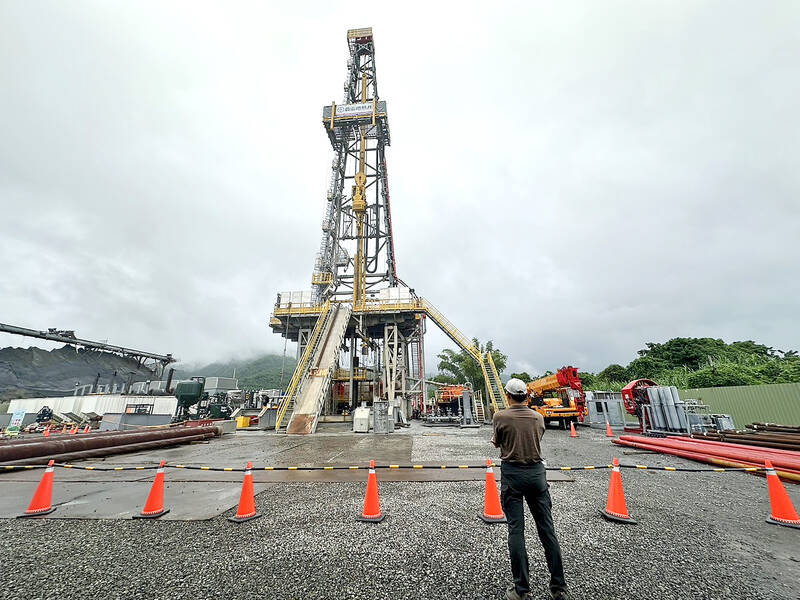Academia Sinica and CPC Corp yesterday began drilling the nation’s first deep geothermal well in Yilan County’s Yuanshan Township (員山).
The 4km-deep well is expected to take 18 months to complete and has an estimated investment of NT$337 million (US$10.54 million), Academia Sinica President James Liao (廖俊智) said.
“While Taiwan has up to 30 gigawatts of potential deep geothermal energy, with an estimated 10 gigawatts being economically viable, only by digging wells can we determine the actual amount of commercially viable geothermal energy,” Liao said at the project’s opening ceremony.

Photo: Yang Yuan-ting, Taipei Times
Data collected during and after the excavation process would be used for future drilling models, helping scientists discover more economically viable heat sources and turn geothermal energy into an important part of clean energy in Taiwan, he said.
To develop and industrialize geothermal energy, relevant laws and regulations need to be updated to entice investors, as current regulations are divided among different government units, Liao said.
Minister of Economic Affairs J.W. Kuo (郭智輝), who also attended the ceremony, said that geothermal resources can be developed into another green energy industry, creating clean energy, job opportunities and promoting local economic prosperity.

Photo: Yang Yuan-ting, Taipei Times
Prior to the start of the drilling yesterday, a research team at Academia Sinica’s Institute of Earth Sciences worked to find potential deep geothermal energy locations, research team member Lee Jian-cheng (李建成) said.
As Taiwan is located in the Pacific Ring of Fire, it is rich in geothermal resources, but “the most challenging task is finding a common location that researchers believe contains geothermal energy,” said another researcher, Huang Hsin-hua (黃信樺).
Using thermal sensing drones to analyze the distribution of heat sources, the research team chose a site on the Lanyang Plain (蘭陽平原) and discovered two sources of deep geothermal energy on either side of the Langyang River (蘭陽溪).
After building 3D models of underground heat sources over two years to pinpoint the geothermal energy locations, they chose to dig the well in Yuanshan County, as the area is more sparsely populated.
While there is confirmed geothermal energy beneath Yuanshan, “there could still be errors of several hundred meters,” Huang said. “Geothermal sources must be physically drilled to verify their existence.”
In the research team’s 3D model, the heat source reached 120°C and started generating energy at 1km to 2km deep, but for the energy to be economically viable, it needs to reach 170°C or more, which requires a depth of at least 4km, Lee said.
While the depth and range of the heat source is still uncertain, it is estimated to be able to generate 20 megawatts (MW) to 30MW of electricity, which is enough to power hundreds of thousands of homes, he said.
Additional reporting by CNA

Global bodies should stop excluding Taiwan for political reasons, President William Lai (賴清德) told Pope Francis in a letter, adding that he agrees war has no winners. The Vatican is one of only 12 countries to retain formal diplomatic ties with Taiwan, and Taipei has watched with concern efforts by Beijing and the Holy See to improve ties. In October, the Vatican and China extended an accord on the appointment of Catholic bishops in China for four years, pointing to a new level of trust between the two parties. Lai, writing to the pope in response to the pontiff’s message on Jan. 1’s

A Vietnamese migrant worker on Thursday won the NT$12 million (US$383,590) jackpot on a scratch-off lottery ticket she bought from a lottery shop in Changhua County’s Puyan Township (埔鹽), Taiwan Lottery Co said yesterday. The lottery winner, who is in her 30s and married, said she would continue to work in Taiwan and send her winnings to her family in Vietnam to improve their life. More Taiwanese and migrant workers have flocked to the lottery shop on Sec 2 of Jhangshuei Road (彰水路) to share in the luck. The shop owner, surnamed Chen (陳), said that his shop has been open for just

TAKE BREAKS: A woman developed cystitis by refusing to get up to use the bathroom while playing mahjong for fear of disturbing her winning streak, a doctor said People should stand up and move around often while traveling or playing mahjong during the Lunar New Year holiday, as prolonged sitting can lead to cystitis or hemorrhoids, doctors said. Yuan’s General Hospital urologist Lee Tsung-hsi (李宗熹) said that he treated a 63-year-old woman surnamed Chao (趙) who had been sitting motionless and holding off going to the bathroom, increasing her risk of bladder infection. Chao would drink beverages and not urinate for several hours while playing mahjong with friends and family, especially when she was on a winning streak, afraid that using the bathroom would ruin her luck, he said. She had

MUST REMAIN FREE: A Chinese takeover of Taiwan would lead to a global conflict, and if the nation blows up, the world’s factories would fall in a week, a minister said Taiwan is like Prague in 1938 facing Adolf Hitler; only if Taiwan remains free and democratic would the world be safe, Deputy Minister of Foreign Affairs Francois Wu (吳志中) said in an interview with Italian newspaper Corriere della Sera. The ministry on Saturday said Corriere della Sera is one of Italy’s oldest and most read newspapers, frequently covers European economic and political issues, and that Wu agreed to an interview with the paper’s senior political analyst Massimo Franco in Taipei on Jan. 3. The interview was published on Jan. 26 with the title “Taiwan like Prague in 1938 with Hitler,” the ministry